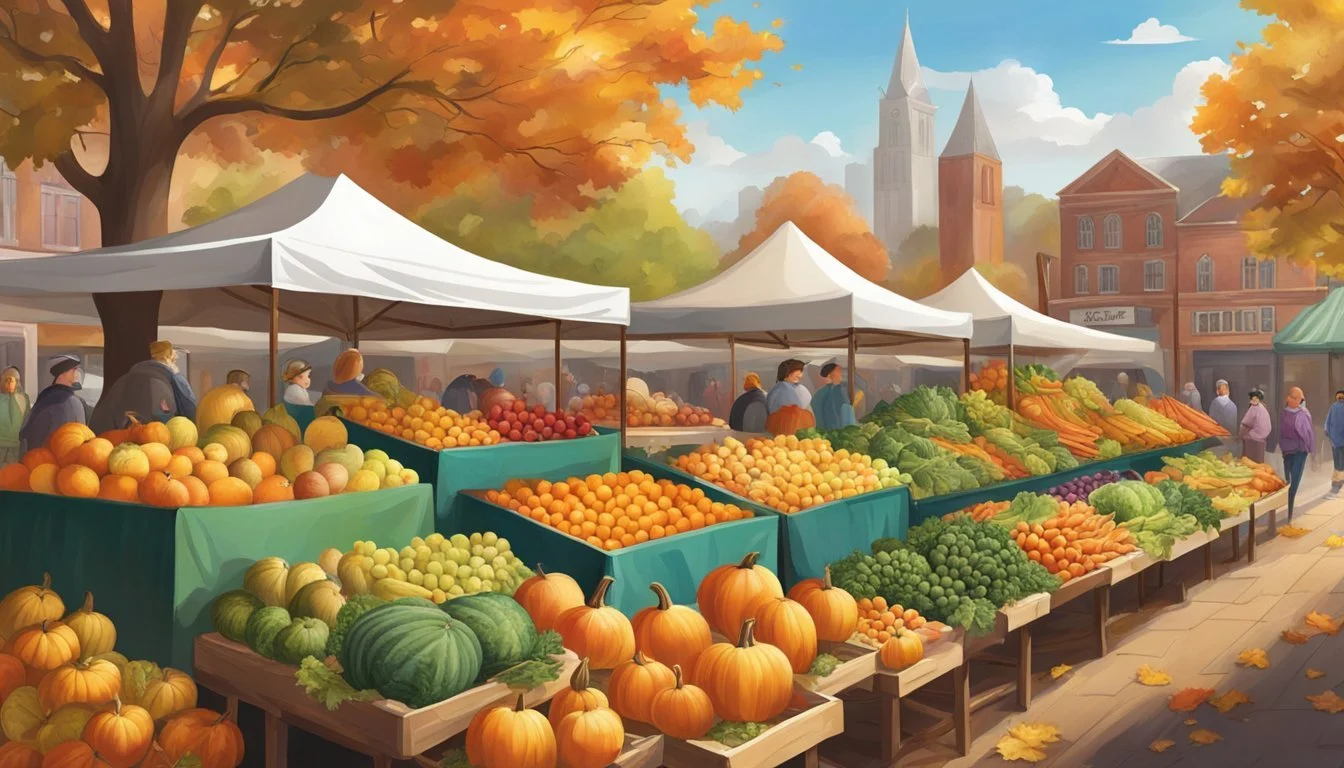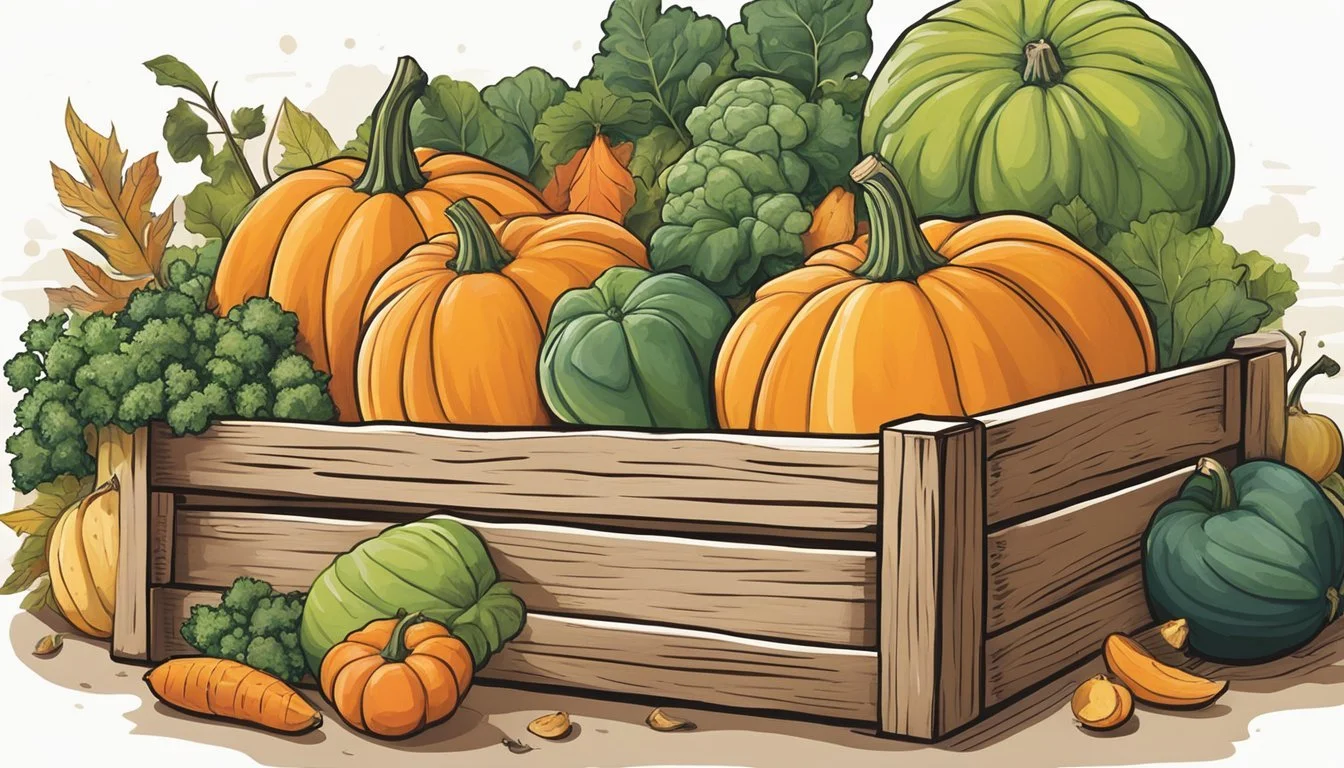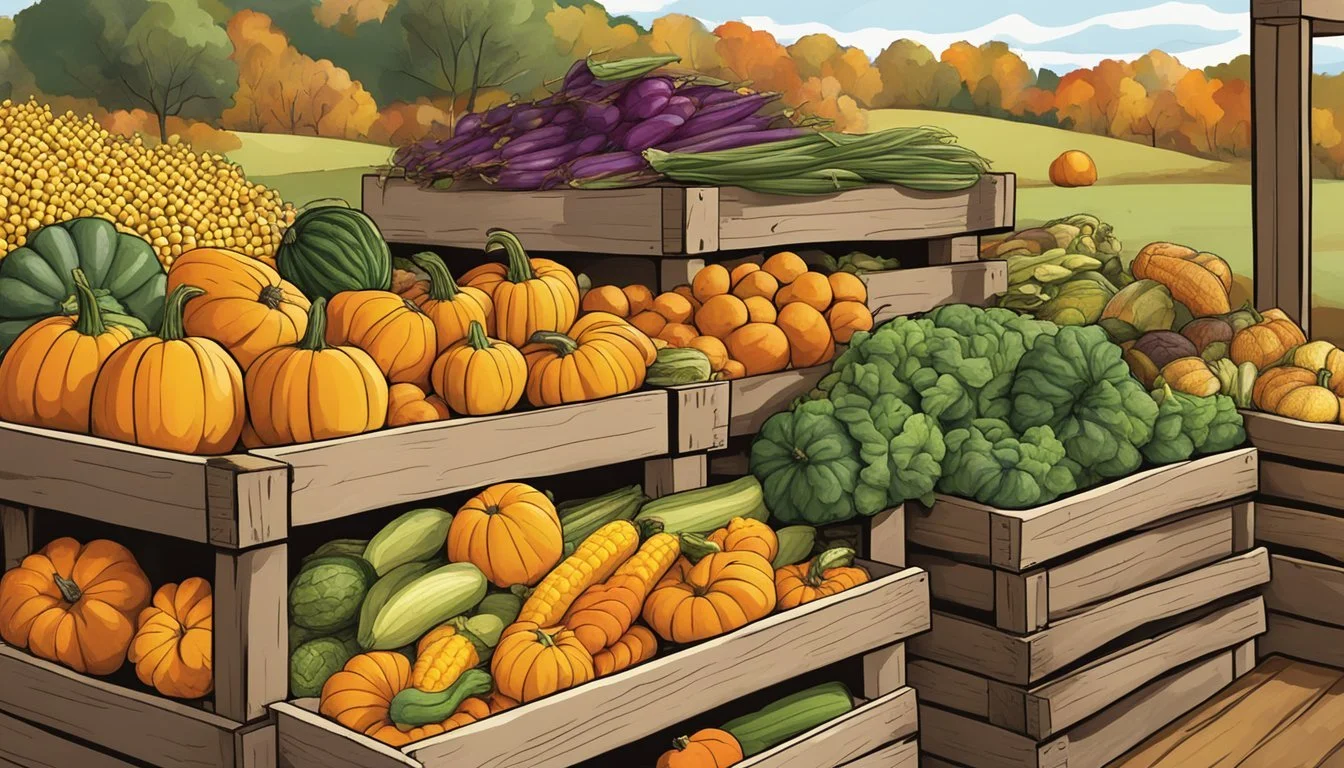Tennessee Seasonal Fruit & Vegetables in November
A Guide to Autumn Harvests
This Article is Part of our Tennessee Seasonal Fruit & Veg Calendar
Tennessee's diverse climate, ranging from cooler mountainous areas to warmer southwestern regions, fosters a variety of fruits and vegetables that thrive in different seasons. November marks the transition from the vibrant growth of summer and fall to the more subdued but still plentiful offerings of late autumn. During this month, residents and visitors can enjoy the last harvests of certain crops, as well as the robust flavors of cool weather produce that peaks during this time.
The state's agricultural calendar in November is rich with root vegetables and hearty greens that withstand the first frosts. The produce available during this month includes sweet potatoes (What wine goes well with sweet potatoes?), turnips, and various types of winter squash. These staples are complemented by leafy greens such as kale, (What wine goes well with kale?) spinach, and collard greens (how long do collard greens last?), which actually benefit from a slight chill, as it enhances their flavors. Furthermore, while many fruits are out of season, apples from the previous year's fall harvests are still available, offering a crisp and sweet option for those looking to savor the last hints of autumn sweetness.
Overview of Tennessee’s Seasonal Produce
November in Tennessee sees a variety of seasonal produce ripe for harvest, offering fresh flavors and nutritional benefits. This month's bounty includes an array of fruits and vegetables each with peak freshness and optimal taste.
Significance of Eating Seasonal Produce
Eating seasonal fruits and vegetables ensures consumers enjoy the freshest produce, packed with maximum flavor and nutritional value. In November, Tennessee's climate allows for the harvest of cool-weather crops that are hearty and nutrient-dense. Seasonal eating also supports local farms and reduces the environmental footprint associated with transportation of out-of-season produce.
Varieties of Produce in November
In November, individuals in Tennessee can expect a selection of produce that includes both fruits and vegetables adept at thriving in cooler temperatures. Key seasonal items typically include:
Fruits: Apples and pears are the main fruits in season, offering versatility in cooking and baking.
Vegetables: Root vegetables like sweet potatoes and various types of winter squash, as well as leafy greens such as spinach and kale.
Vegetables In Season Fruits In Season Sweet potatoes Apples Winter squash Pears Spinach Kale
These fruits and vegetables represent just a slice of the diverse produce available from Tennessee's farms during the fall season.
November Fruits in Tennessee
In November, the harvest season is winding down in Tennessee but there are still some fruits that grace the markets and farms. At this time, one can find a variety of tree fruits and berries nonetheless.
Tree Fruits
Within Tennessee orchards, apples continue to be available with late-season varieties reaching peak ripeness. These often include types that are firmer and store well, making them ideal for winter use. Pears follow a similar pattern, with later varieties offering sweet flavors well into the month. Additionally, persimmons, a less common but delightful fruit, are typically ripe for picking in November. They are known for their unique flavor which is best when the fruit becomes soft to the touch.
Berries
While berry season is predominantly over in Tennessee, some farms may offer cranberries during November. These tart berries are not widely grown in the state, but they can still be found in select locations, usually harvested from managed wetland areas or purchased from cooler Northern states to be sold in Tennessee markets.
November Vegetables in Tennessee
As November ushers in cooler temperatures in Tennessee, a variety of hardy vegetables come into season. Root vegetables and leafy greens thrive in the chill, while winter squash and gourds reach peak maturity.
Root Vegetables
Tennessee's November soil yields a bountiful harvest of root vegetables. Sweet potatoes and turnips are staples during this time, offering versatility and robust flavors for the Thanksgiving table. The earth also provides nutritious beets (how long do beets last?), with their deep red hues signaling their readiness for harvest. These vegetables are ideal for storage and provide essential nutrients throughout the colder months.
Beets: Harvested mid-fall; earthy flavor.
Turnips: Peak season; can be mashed or roasted.
Sweet Potatoes: Available; perfect for pies or casseroles.
Leafy Greens
The cooler weather enhances the taste and texture of Tennessee's leafy greens. Kale and lettuce are in ample supply, making them perfect additions to autumnal salads and warm dishes. Cabbage also responds well to the cold, maturing into crisp heads that are suitable for slaws or sautéing.
Kale: Ideal for salads and chips; rich in vitamins.
Lettuce: Various types available; for salads and garnishes.
Cabbage: Great for fermenting or as a side dish.
Winter Squash and Gourds
Winter squash and gourds are among the stars of the season. Varieties such as pumpkins and winter squash are harvested, with their firm flesh making them ideal for baking, roasting, and soups. Brussels sprouts (how long do brussels sprouts last?), resembling miniature cabbages, also reach their peak, ready to be roasted or steamed to bring out their nutty flavor.
Pumpkins: Common for decor and cooking; rich in flavor.
Winter Squash: Includes butternut and acorn squashes; versatile in use.
Brussels Sprouts: Harvest continues; best when roasted.
Local Farm Attractions in November
November in Tennessee brings a transition in local farm activities, from harvest to holiday preparation. Visitors can experience the tail end of the fall harvest and engage in festive events as farms pivot to seasonal attractions.
Pick-Your-Own Farms
At this time of year, pick-your-own farms shift from the summer's bounty to the late-autumn harvests. Visitors can expect to gather fall produce such as turnips, and in some cases, late-season raspberries. They experience the satisfaction of harvesting their own food while enjoying the crisp autumn air.
Available Produce:
Turnips
Late-season Raspberries (limited farms)
Pumpkin Patches
Pumpkin patches are a hallmark of November farm attractions in Tennessee, with many farms opening their fields to the public for the final selection of pumpkins before they close out the season. These patches often feature a range of pumpkin varieties, from jack-o’-lantern types to heirloom species suitable for pies and culinary use.
Activities:
Pumpkin picking
Photo opportunities amidst the scenic patch
By visiting local farms during this time, guests can forge a connection with the region's agricultural roots and take part in the seasonal rhythms of farm life.
Culinary Applications of November Produce
The selection of Tennessee produce in November offers a diverse range of options for both cooking and preservation. This month's harvest can enhance a variety of recipes and can be stored effectively using several methods.
Recipes
Vegetables such as beets, broccoli, brussels sprouts, cabbage, cauliflower, celery (how long does celery last?), and kale reach their peak quality in November. These ingredients can be transformed into comforting autumn dishes. Roasted Brussels sprouts with a touch of olive oil and sea salt (how long does sea salt last?) make a simple yet delicious side. Butternut squash soup is another classic, warming option that incorporates the creaminess of fresh squash with the depth of seasonal spices. Chefs often recommend pairing parsnips with honey and thyme to create a sweet and flavorful roasting dish.
Preservation Methods
Canning is a common method to preserve the abundance of November fruits and vegetables. Beets and cauliflower can be pickled with vinegar, water, and select spices to extend their shelf life. Freezing is ideal for vegetables like broccoli and greens, which should be blanched before to retain color and texture. Celery root and potatoes store well in a cool, dark place, maintaining their quality for months. These methods ensure that the harvest's bounty is available for use beyond the season.
By utilizing the available produce of November in these recipes and preservation efforts, one can truly take advantage of the season's offerings.
Year-Round Produce Availability
In Tennessee, certain vegetables are harvested throughout the year, and some fruits and vegetables are grown out-of-season using advanced agricultural technologies.
Consistently Harvested Vegetables
Some vegetables thrive regardless of the season and can be consistently harvested in Tennessee. These year-round vegetables include:
Carrots: Hardy root vegetables that can withstand varying weather conditions.
Kale: A cold-resistant leafy green, kale is a versatile vegetable suited for continuous harvest.
Spinach: Cool-season crop that can be grown nearly year-round through successive plantings.
By maintaining a cycle of planting and harvesting, these vegetables provide a constant supply for Tennessee residents.
Greenhouses and Off-Season Production
Advancements in agricultural technology allow Tennessee farmers to extend the growing seasons of certain produce:
Tomatoes: Often grown in controlled greenhouse environments to ensure year-round availability.
Cucumbers: Similarly cultivated under glass to provide a stable supply even during colder months.
Strawberries: Some varieties can be produced off-season in high tunnels and greenhouses.
By employing greenhouses and other protective structures, farmers can deliver fresh fruits and vegetables that defy the traditional growing calendar.
Benefits of Supporting Local Agriculture
When consumers choose to purchase their fruits and vegetables from local Tennessee farms during the seasonal peak, they partake in a cycle that enriches the state's economy and promotes environmental stewardship.
Economic Impact
Local farms are crucial economic engines for Tennessee, particularly in the autumn months when the harvest includes a variety of seasonal vegetables. Investing in local agriculture means that the financial benefits stay within the community, bolstering the local economy. Funds spent on Tennessee-grown produce circulate among local businesses and services, creating a multiplier effect. For example:
Job Creation: Local farms provide employment opportunities within the state.
Local Investment: Money spent on locally sourced products fuels the vitality of the agricultural sector and surrounding businesses.
Environmental Considerations
Supporting Tennessee's local agriculture also carries significant environmental benefits. Farms that produce seasonal fruits and vegetables tend to engage in sustainable practices that minimize the ecological footprint.
Reduced Transportation: Locally grown produce travels shorter distances, resulting in lower greenhouse gas emissions.
Sustainable Practices: Many local farms are adopting more sustainable farming methods, which may include reduced pesticide use and conservation-focused soil management. This is particularly true for fall crops, which include a variety of robust vegetables.
By buying local, consumers contribute to a smaller carbon footprint and a more sustainable future for agriculture in the state.








